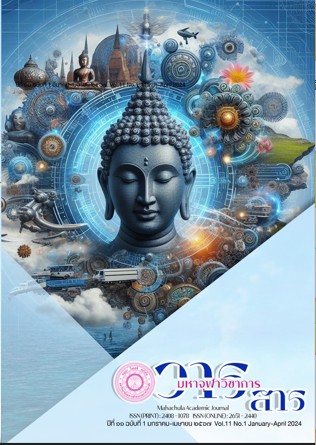Visionary The Visionary Leadership of School Administrators Affecting Teachers’ Performance Agreements in Educational Institutions Under Ang thong Primary Educational Service Area Office
Main Article Content
Abstract
The purposes of this research were (1) to study the visionary leadership of educational institution administrators; Under Ang Thong Primary Educational Service Area Office (2) to study teachers' work performance according to the work agreement Under Ang Thong Primary Educational Service Area Office (3) to study the visionary leadership of school administrators that affects teachers' performance according to the work agreement. Under Ang Thong Primary Educational Service Area Office. The sample group was educational institution administrators and teachers. under the jurisdiction of Ang Thong Primary Educational Service Area Office, academic year 2022, a total of 305 people were obtained by selecting a stratified random sampling. The research instrument was a questionnaire with a 5-level rating scale. There were statistical values used in data analysis, including percentage, mean, standard deviation, and stepwise multiple regression analysis.
The results of the research were as follow (1) Educational institution administrators of Ang Thong Primary Educational Service Area Office There was a high level of visionary leadership. (2) Teachers under Ang Thong Primary Educational Service Area Office Work is performed according to the teachers' work agreement. The Overview was at a high level. According to the criteria of the Office of the Teacher Civil Service and Educational personnel commission (3) Visionary leadership of school administrators in creating motivation, affects teachers' performance according to the work agreement. under Ang Thong Primary Educational Service Area Office statistically significant at the .05 level, together they predicted 39 percent of teachers' performance according to the work performance agreement.
Article Details

This work is licensed under a Creative Commons Attribution-NonCommercial-NoDerivatives 4.0 International License.
References
กิตต์กาญจน์ ปฏิพันธ์. “โมเดลสมการโครงสร้างภาวะผู้นำเชิงสร้างสรรค์ ของผู้บริหารสถานศึกษา-อาชีวศึกษา”. ศึกษาศาสตรดุษฎีบัณฑิต สาขาวิชาการบริหารการศึกษา. คณะศึกษาศาสตร์: มหาวิทยาลัยขอนแก่น, ๒๕๕๕.
เกศสุดา รัชฏาวิศิษฐกุล และจุฑารัตน์ นิรันดร. “บทบาทผู้บริหารในการพัฒนาภาวะผู้นำของครูสังกัดสำนักงานเขตพื้นที่การศึกษาประถมศึกษาเพชรบุรี เขต ๑”. วารสารมนุษยศาสตร์ และสังคมศาสตร์ มหาวิทยาลัยราชพฤกษ์, ปีที่ ๖ ฉบับที่ ๒ (พฤษภาคม – สิงหาคม ๒๕๖๓) : ๑๔-๒๖.
สำนักงานคณะกรรมการการศึกษาขั้นพื้นฐาน. คู่มือการบริหารจัดการคุณภาพ. กรุงเทพมหานคร: โรงพิมพ์ชุมนุมสหกรณ์การเกษตรแห่งประเทศไทย, ๒๕๖๒.
อัญชลี คล้ายขำ, ปิยะนันท์ หิรัณย์ชโลทร และชลาธิป สมาหิโต. “การจัดกิจกรรมการเรียนรู้โดยใช้วรรณกรรมเป็นฐานเพื่อส่งเสริมการตระหนักรู้ในตนเองของเด็กปฐมวัย”. วารสารครุศาสตร์มหาวิทยาลัยราชภัฏมหาสารคาม, ปีที่ ๑๘ ฉบับที่ ๓ (กันยายน–ธันวาคม ๒๕๖๔) : ๑๙๕-๒๐๗.
สำนักงานคณะกรรมการข้าราชการครูและบุคลากรทางการศึกษา. “คู่มือการดำเนินการตามหลักเกณฑ์และวิธีการประเมินตำแหน่ง และวิทยฐานะข้าราชการครูและบุคลากรทางการศึกษาตำแหน่งครู”. [ออนไลน์]. แหล่งที่มา: https//otepc.go.th/images/00YEAR2564/ 03_PV1/1Mv9-2564.pdf/ [๒๙ กรกฎาคม ๒๕๖๖].
สำนักนโยบายและยุทธศาสตร์. “แผนยุทธศาสตร์กระทรวงศึกษาธิการ (พ.ศ. ๒๕๖๓ – ๒๕๖๕)”. [ออนไลน์]. แหล่งที่มา: https//www.bkkedu.in.th./ [๒๙ กรกฎาคม ๒๕๖๖].


